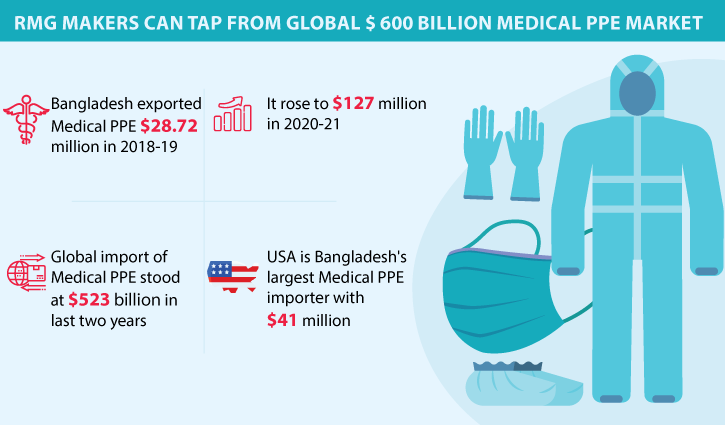As the global demand for Medical Personal Protection Equipment (MPPE) has sprung to nearly $ 600 billion, Bangladesh’s apparel manufacturers are feeling hesitant to tap the opportunities thinking such product market is not sustainable, a study said.
However, Bangladesh’s facemasks export increased from $28.72 million in 2018-19 to $127 million in the 2020-21 fiscal year. The country however imported facemasks worth $740 million in the period, the study said.
Hospitals and various health care centers across the globe have formed a stable market for Medical PPE worth $34 billion, according to the World Health Organization.
The study was shared at a webinar in the city on Monday organized by Business Initiative Leading Development (BUILD), a non-government organization.
The study said the readymade garment sub-sector can take part in producing the Medical Personal Protection Equipment (MPPE) to benefit from the $510-$595 billion global market.
The webinar was titled ‘Exploring Growth Opportunities: Production and Export of Medical PPE.’
Commerce Minister Tipu Munshi said the government is committed to providing all-out support to promote the Medical and Personal Protective Equipment (MPPE) industry in Bangladesh, considering it as an important sector for attaining export diversification and deeper industrialization.
He was addressing the webinar as chief guest.

The Commerce Minister said his ministry will take necessary steps to ensure that enabling policies and regulations are put in place for the emerging Medical PPE industry.
Bangladesh needs to develop the Medical PPE industry in a strategic manner, setting targets, extending the right incentives, ensuring public-private cooperation, and following up closely on the progress and constraints, said Tapan Kanti Ghosh, the commerce secretary.
newly flourishing product requires investment, tax exemption, incentives, and a policy guideline from the government to sustain in the longer run,” said Faruque Hasan, President of Bangladesh Garment Manufacturers and Exporters Association (BGMEA).
According to the study, Medical PPE manufacturing soared by 300 percent amid the Covid-19 outbreak. Of this, production of medical masks has been increased by 500-1,200 percent, gloves 200-600 percent, gowns 100-200 percent, shoe cover 50-100 percent, aprons 50-100 percent, overalls 50-100 percent, and goggles 25-50 percent, respectively.
The keynote presenter Ferdaus Ara Begum, CEO of BUILD said Bangladesh has already developed an infrastructure to export apparel to some giant nations.
“Therefore, if the government provides the required facilities, the Medical PPE industry can lead the global markets, like RMG,” she told the webinar.
The total global import of Medical PPE stood at $523 billion in the last two years amid the pandemic. Among the global importers, the US leads the pack with $107 billion, followed by Germany, the UK, and France. Most of these nations are already significant importers of readymade garments from Bangladesh.
Currently, the USA is the largest importer of Bangladeshi MPPE products. Bangladesh exported facemasks worth $99 million in 2002 to 10 countries. The USA had imported $41.3 million worth of facemasks.
The other European nations including Denmark, Germany, and the UK import Medical PPE from Bangladesh.
Recognizing the export diversification is a major challenge for the Bangladesh economy as the country seeks to alleviate its heavy dependence on the RMG sector, BUILD Chairperson Abul Kasem Khan said the best strategy to begin diversification is to build on Bangladesh’s strength. He cited five key areas to focus on to develop the sector: right products, proper incentives, appropriate policies, knowledge, and skills, as well as proper technology and logistical system.
Nuzhat Anwar, Acting Country Manager, Bangladesh, Bhutan and Nepal, International Finance Corporation (IFC) said businesses need to find innovative and sustainable ways to boost their production and export revenue to recover from the impacts of COVID19. IFC is providing the necessary support to bridge knowledge gaps in the Medical and Personal Protective Equipment (MPPE) sector in order to enhance private sector growth and support economic recovery.”
Faruque Hasan President, BGMEA was present as the Special Guest and appreciated BUILD for coming up with a number of useful suggestions which are very much required for the sector. He said, “Strengthening collaboration along with the regulatory bodies, technical Know-How, and a robust backward linkage is important.”
He also emphasized the need for attracting FDI in this respect.
RMG sector was the first to focus on the MPPE segment, with the dwindling demand for staple products at the early stages of the pandemic. Renowned pharma companies are investing in OTC or Non-medicinal products, expecting high demand and export. MPPE products are highly regulated with stringent quality requirements and require strong technical know-how, which has emerged as a key challenge.
The panel discussion was conducted by Asif Ibrahim, Chairman, Chittagong Stock Exchange (CSE). He recognized the importance of public-private collaboration for promoting the MPPE industry.
AHM Ahsan, Vice Chairman, Export Promotion Bureau (EPB), said Bangladesh had 25% export growth during July-November 2021 over the same quarter in the preceding year. In a brief study of its own, EPB found it difficult to identify and segregate Medical PPEs due to multiple usages of the products. He also mentioned over-dependency on China on sourcing of raw materials to produce Medical PPE items.
















